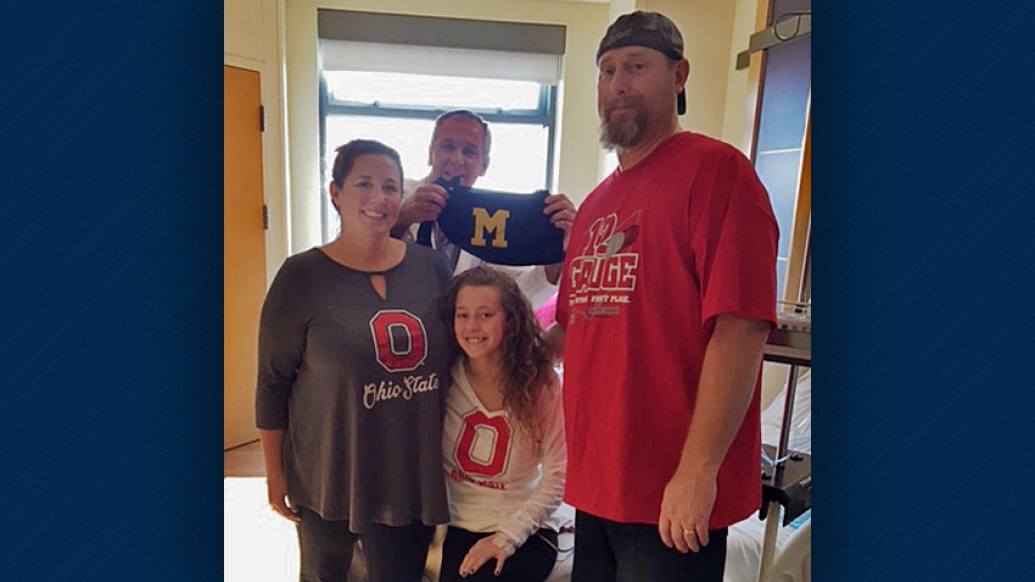An Ohio State family joins Michigan’s team for a fundraising competition after their daughter was treated at C.S. Mott Children’s Hospital.
1:00 PM
Author |

Olivia Olsen doesn't remember passing out on a football field, unconscious as her father frantically tried CPR and another adult used an automated external defibrillator (AED) to revive her heart.
MORE FROM THE HEALTH BLOG: Subscribe to our weekly newsletter
She woke up nearly three days later in the pediatric intensive care unit at the University of Michigan C.S. Mott Children's Hospital.
"We were in 'enemy territory' but also in the best place we could be," her mother, Deanna, says.
As avid Ohio State University fans, the Toledo, Ohio, family never imagined spending three weeks in Wolverine country. But they are grateful that it's where they landed for care after Olivia, 13, experienced sudden cardiac arrest before Halloween this year.
Olivia, better known by her nickname "Birdie," spent most of her time in the Mott PICU where care teams stabilized her heart and lungs to prepare her for a necessary heart procedure.
And it just so happened that the same U-M unit where she was recovering had recently joined forces with the Buckeyes to improve care for young patients like her.
In advance of Saturday's big rivalry football game in Ohio Stadium, care teams from pediatric ICUs at Mott and Nationwide Children's Hospital in Columbus have been competing in the Goal Line Challenge — a contest to see who can raise the most money for their respective unit's efforts to improve care for critically ill children. The winner will be announced on game day.
The Olsens, meanwhile, participated in the fundraiser and did something they never expected in their lifetimes: join U-M's team.
But that doesn't mean they're switching alliances.
"We cheer against Michigan football, but we are big fans of the Michigan hospital," Deanna says. "They saved our daughter's life."
Trouble and treatment
Olivia, an active participant in softball, basketball, cheerleading and volleyball, has an abnormal heart valve and occasional extra heartbeats.
The condition isn't uncommon, but experiencing cardiac arrest as a result is rare, says her pediatric cardiologist, David Bradley, M.D.
The eighth-grader had been talking to a friend while waiting for her dad, Matt, to finish coaching football practice when she suddenly arrested Oct. 27. Fortunately, the school had an AED on hand, which delivers a shock through the chest that travels to the heart and halts an abnormal, ineffective rhythm.
She was taken to a nearby Ohio hospital before being transferred to Mott.
In Olivia's case, the AED "saved her life," Bradley says, noting that groups like Project Adam promote AED availability in every school.
Bradley surgically placed an implantable cardioverter defibrillator (ICD) in Olivia after she was stabilized and moved out of the ICU. The size of a sliced hockey puck, the device is inserted under the skin of the chest to monitor heart rhythm. If it senses trouble, it shocks the heart back into regular rhythm within 10 seconds.
Giving thanks — and donations
This Thanksgiving, the Olsens are thankful to be home safe and sound with Olivia and their other children, Gunner, 16, and Lucy, 11.
They're also happy, of course, to be watching their Buckeyes play Michigan from the comfort of their own home.
SEE ALSO: A Little Victor with Spartan Devotion
"Three weekends in a row I watched Ohio State games from a University of Michigan hospital room," Matt says with a laugh.
As for the score in donation tallies, Michigan is currently leading in the Wolverine-Buckeye ICU fundraiser. Money given to the U-M team will help grow The LIFE Fund, an endowment that supports research projects, educational programs, outreach efforts, quality improvement initiatives and novel new therapies for critically ill and injured children.
Contributions to the OSU/Nationwide Children's team will support clinical and translational research programs dedicated to learning from critically ill patients and developing new treatments.
The PICU at Mott provides advanced care for infants, children and young adults with a wide variety of life-threatening issues, including respiratory failure, severe infections, breathing difficulties, traumatic injuries and recovery from major surgery.
"ICU physicians and nurses are on the front lines. This team is that tip of the spear in providing critical care for children 24 hours a day," says Mike Quasney, M.D., director of the Division of Pediatric Critical Care Medicine at Mott.
"Whether patients suffer from cancer or lung failure or kidney failure or any other critical condition, ICU teams are prepared to provide life-sustaining care to give them the best chance of recovering.
"Despite being rivals on the football field, researchers from Michigan and Ohio State have been strong partners in our charge to better understand children who are critically ill so we can provide the highest quality care," Quasney adds of the fundraiser. "The more we advance research in this area, the better we can take care of patients like Olivia."

Explore a variety of healthcare news & stories by visiting the Health Lab home page for more articles.

Department of Communication at Michigan Medicine
Want top health & research news weekly? Sign up for Health Lab’s newsletters today!





